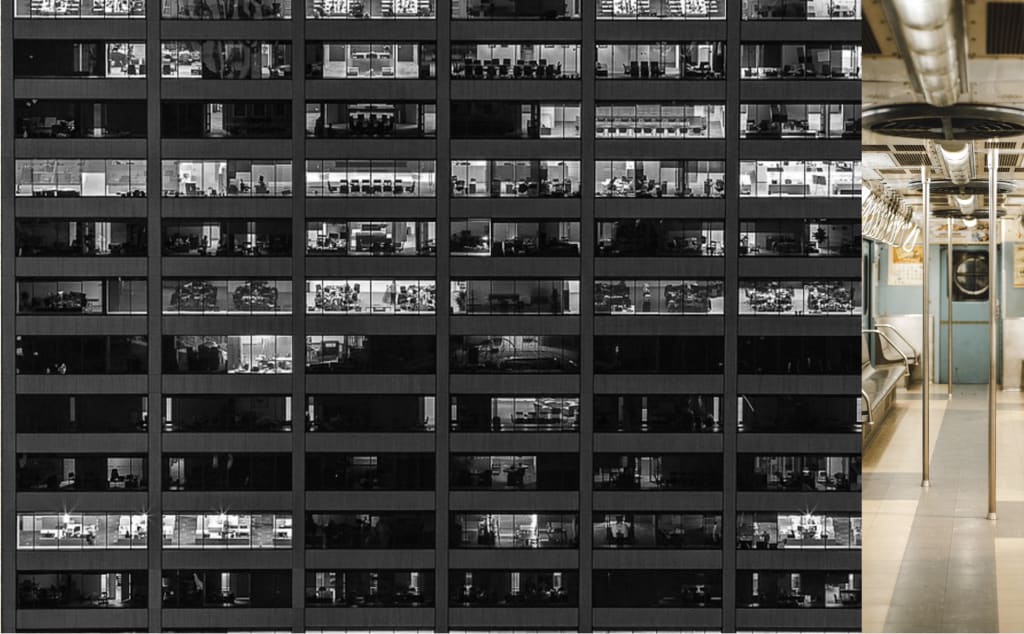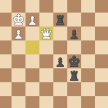
Look at her, sitting on the train while pondering it. The novelty of the red line: that the trains that run on it refuse to stay below ground, and instead flit between identities. Subways sometimes and otherwise elevated, roaring above the streets. The trouble of the blue line: that it runs all day and night between the airport and the center of the city, and the line between those destinations intersects a mess of neighborhoods whose inhabitants feed into train cars with no uniformity whatsoever, when it comes to their number and general character. These are not things that she has observed herself, no—just fragments of small talk borrowed from the other students chatting before class earlier that afternoon, ideas with no real basis—many trains in many places run above and below sidewalks, wouldn’t she know this—ideas about the city that, real or not, have given her something to compare her own experience against, here at the Sedgwick stop of the brown line that lifts quiet passengers above the streets without ever submerging.
Is it strange that she cannot be on the train without thinking of being on the train? So much notice, so many discrete acts of registering: which people get off where, how long they give themselves to stand up and exit, what they are carrying, and what might they have left back at home. What kind of home they are headed towards (or away from). Before her class—why did it have to have been the first class?—she'd seen a woman with a red umbrella walking morosely through the halls. She found herself wishing the woman were on the train with her, so they could be strangers together.
Someone riding with her should tap her on the shoulder, briefly break etiquette, and tell her: none of these trains are brown, or red, or blue. These colors are non-teleological trappings. Universal signifiers ascribed to routes between towers raised up by as many accidents. All of the trains are grey. Some, but not all, have thin stripes corresponding to their actual “color.” Some, but not all, have digital rectangles on their sides and nose emblazoned with the name of their line, a redundant two-word phrase—since what else besides “line” would the word for a color be modifying, here—that is in face doubly redundant, enclosed by a corresponding colored rectangle—since anyone who cannot translate their english meaning is already underwater in an urban sea of navigational ciphers for which certain digitally-reproduced slices of the light spectrum offer no further clarity. It's cute how she finds the current stop curious just because it's possible to pull into it at the same time as red and purple trains going the same direction—on the one hand this sudden tricolor ambiguity provides her with reassuring reasoning for the system’s existence, but on the other: if all of these trains are on the same track going the same direction, what do the colors even mean anymore? Should she play along and find meaning only in the simple beauty of a greater system? Maybe.
Before her little trance of panic here on the train, the teacher—she should really be thinking of her as an instructor, or professor, or whatever she actually was—had asked them to introduce themselves by describing something they found beautiful. One at a time, around the room. “What have you engaged with recently, that you’ve found beautiful?” As she rephrased the question for them several times—stoically, ”what has rocked your world,” and then more formerly, “what is a cultural object that’s resonated with you"—a simpler and more familiar way of asking it lurked under the surface of the classroom’s fraught context—tell us something interesting about yourself—and then under that, yet another title, a simple plural compound word for that get-to-know-each-other ritual that everyone proceeded to dance around faux-intellectually in an attempt to locate the appeal of the exercise.
Thinking of what had not been properly named in that moment, her mind had run express past all of the things she’d ever considered beautiful, past phone-call ink doodles and mahogany birdhouses, french press coffee, animated koi ponds; past the things she considered somewhat beautiful but which she ball-parked as better answers given the self-presentation at stake, like small press chapbooks left under the bed and oil landscapes hanging at the museum mere blocks from the classroom and avant garde documentaries about state surveillance; past others’ impressive attempts to define themselves just as singularly via guarded verbal scaffolding a la “I recently stumbled upon…” or “has anyone else...”, as if anyone else could be expected to construct characters out of self-selected fascinations at a time like this, when they were so rapidly being constructed themselves; well past these alleged beauties and the connotations their utterances had sent echoing around the room like roman candles she arrived quite suddenly between a pair of rural memories, the first from winter and the second a summer scene that preceded it: swimming in the small pond near her parents’ house as a kid, stricken with fear at the prospect of climbing up the decaying wood of the old pier posts near the shore so that the others swimming with her might watch her dive off of it.
As the train pulled into the next stop she looked up, realizing that all of the skyscrapers she’d wanted to watch up close out the windows were already several miles behind her.
How easy it is for her to observe: that the lion’s share of anxiety is predicated on narcissism—on a wealth of imagined reactions to her own being in the world, a near constant anticipation of how others would react negatively to her own action, inaction—without that observation taking any of the kick out of the visceral certainty with which she wants to be seen, reacted to, and so, justified. If these worries and adjustments exist only to sit next to her on the train, then where were they going together?
At this point the train pulled out of Paulina despite the fact that she didn’t yet know how to pronounce it, an insular quirk of the city’s to exist alongside New York’s Houston or, hell, London’s Leicester, neither of which are streets she’s walked through or read aloud, due to, incidentally and respectively, former moments of macro- and micro-uncertainty. Isn’t her inability to find a sense of place between these train stops, to call these buildings and streets and neighborhoods and cities by their given names and to do so confidently, spatial proof for her inability to fit somewhere, like, emotionally? Wouldn’t even her smallest uncertainties, these regular expressions of apprehension, nonetheless have had some genesis back in the formative days of childhood, some wellspring of anxiety that had been leaking ever since—perhaps an indecision to jump, to exit the confines of her own head so theatrically at the exact moment it mattered the most?
The instructor—professor?—had elected to take turns in clockwise fashion around the room. She herself had been sitting at four o’clock, having opted to sit close but not too close to the instructor—this was the way of a new life, after all, a fresh start required special attention to decisions and their ripple effects—but that meant there had only been three (!) examples of beauty from which to buy time for her own answer, and she’d been too busy remembering how totally and fundamentally unable she'd felt at the prospect of climbing the wood post sticking vertically out of the warm pond water, to then jump off of it was unfathomable, so that by the time the midwestern summer had lurched into winter the way it always does and the pond had frozen over, it seemed to do so not at all seasonally, but permanently. Queue the other memory, from winter—the explanatory work needed to explain what little beauty was there, all of this while the third girl has finished her own answer, what was she even thinking?
Her stop was after this one. Did it occur to her that she becomes frozen merely by the many ways to be in any given moment?
Has she really, until today, refrained from ascending, in the proper order, these several realizations: that many people can have the same idea, and never express it; that two different ideas expressed the same way are identical regardless, in the minds of others; that she not only exists in the minds of others as a collection of ideas they have chosen to believe about her, but that people, and places, and the connections between them are all so excruciatingly incidental—just as many people can sit on the same train between vastly different lives? Wouldn't it be nicer to ride the brown line forever, allowing urban life to flow undeterred, immune to the intrusion and spiraling effect of other passengers, other ideas. But what’s worse: that she allowed herself to be defined by negation—reserved, nervous, sexless, because these are the ways in which she is unlike the first three students, the ways she didn’t quite fit on the spectrum they had erected through their articulations—or that she had disallowed herself from being defined, at all? How unlucky, really, was the company in the first-day classroom given that they’d all laughed so in-sync at her own answer: “The train system in the city.” Of all things she could have said. Of course none of them cared that one winter she went back to the pond when it was frozen over, threw rocks at the surface to test its hold and walked softly over to the post, climbed up the rope that had been hardened by the thin air, shaking terribly just so she could sit briefly, climb back down, and live her life without being forced to imagine what it’d looked like from the top—black, opaque, beautiful—they can't hear her explaining it, because she is already far away, somewhere else, missing her stop.
About the Creator
S. J. R.
Based in Chicago, submitting sporadically.






Comments
There are no comments for this story
Be the first to respond and start the conversation.